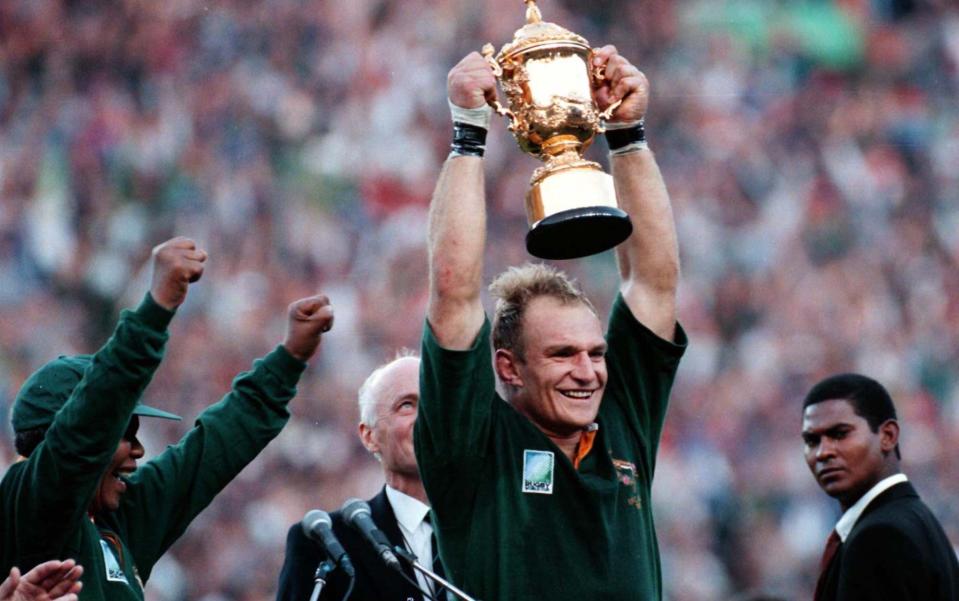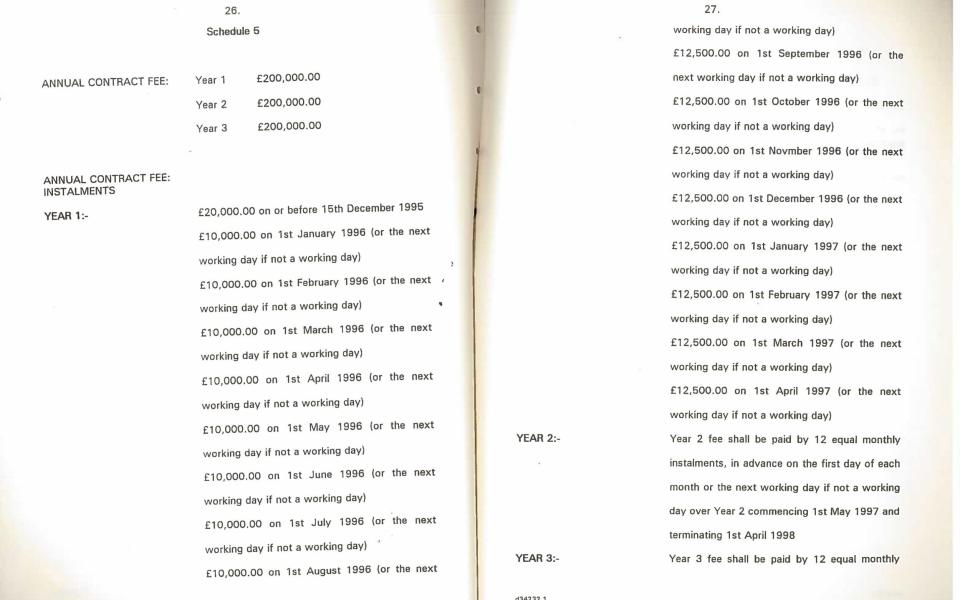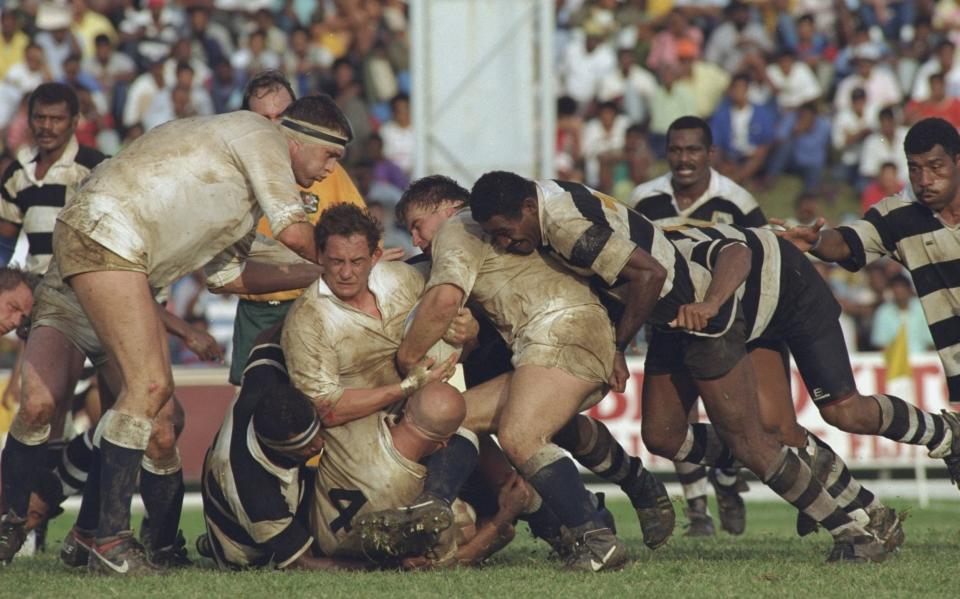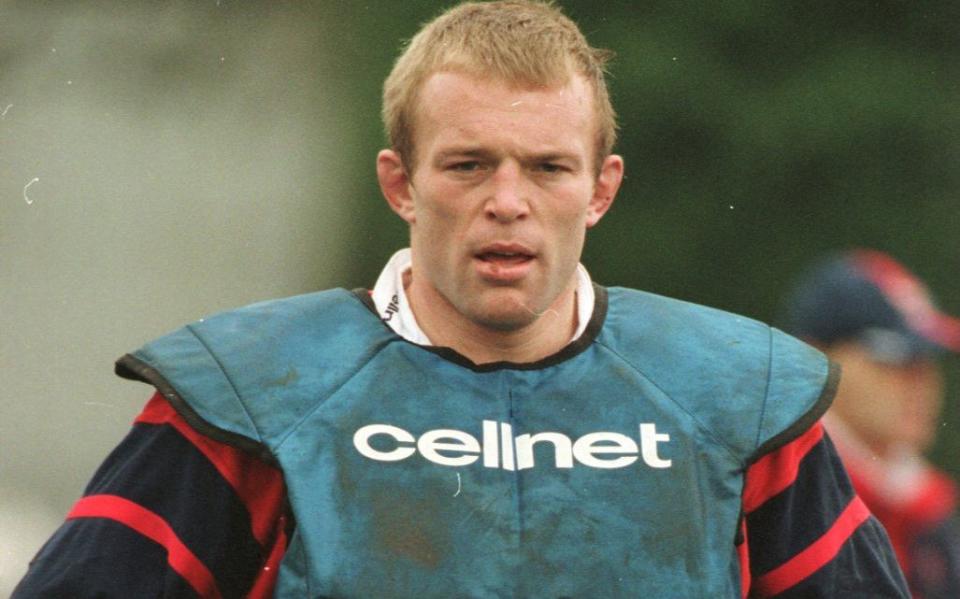It has been locked away in a vault for almost thirty years, but the original player contract from the ‘World Rugby Corporation’, the Kerry Packer-backed £200m rebel rugby circus that threatened to create a breakaway global franchise league in 1995, can now be seen for the first time be revealed.
The document, which remains in pristine condition, serves as a stark – and fascinating – reminder of the ‘rugby war’ that could have ended more than 120 years of Test rugby.
And according to the owner, former England and British and Irish Lions lock up Martin Bayfield in a moment of missed opportunity for the Rugby Football Union, the consequences of which are still being felt as the union is set to offer new hybrid contracts to gain more control over their players.
The battle for the future of rugby union, as it came up against professionalism against the backdrop of the 1995 World Cup in South Africa, was fought out mainly in the Southern Hemisphere, as media moguls Rupert Murdoch and Packer went head-to-head in a race to secure the broadcaster. rights that would hasten the end of amateur play.
Murdoch appeared to have struck the decisive blow when, on the eve of the World Cup final between the Springboks and New Zealand, it was announced that the three main unions in the southern hemisphere – South Africa, New Zealand and Australia – would pay a sum of 550 million dollars agreed. dealing with his News Corp organization.
The ten-year deal gave News Corp exclusive television rights to a new annual Tri-Nations international tournament, a Super 12 club competition and all incoming Test tours to the three countries.
But what News Corp, and indeed the unions, did not know at the time was that behind the scenes the leading players in each of the three countries had already been secretly contacted by the representatives of the World Rugby Corporation (WRC), which was on the frontline by former Wallaby propagandist Ross Turnbull and later backed by Packer.
Around 400 players had signed provisional contracts, including the majority of players from the New Zealand, Australian and South Africa squads after the WRC contacted their respective captains, Sean Fitzpatrick, Phil Kearns and Francois Pienaar.


Ultimately, it was the Murdoch-backed unions who would prevail after the Springboks team’s support for the WRC collapsed under pressure from the South African Rugby Union’s controversial president, Louis Luyt.
While these machinations between players, unions and broadcasters have since been well documented, what is less known is how close the England team came at the time to signing up for the WRC – and turning their backs on the Rugby Football Union.
The contract offered to the England players was just as lucrative as to their Southern Hemisphere rivals, with the 24-page document entitled the ‘Deed for the Provision of Services’ including the offer of a salary of £200,000 per season , commencing on 15 December 1995, as well as a match fee of £1,350 per match.


The voluminous document, which bore the stamp of Turnbull Hill Partners, a law firm based in the Charlestown Mall in New South Wales, Australia, covered every aspect of the player’s life in the new global global league, which proposed 30 franchises spread across to include the entire world. around the world, which was due to start in September 1996.
“The Corporation proposes to establish a global organization for professional rugby commencing in 1996,” the contract said, even though at the time the game had yet to be declared ‘open’ by the International Rugby Board, the governing body of the global game now known as World Rugby.
“The Corporation wishes to engage the services of the player to play Rugby for the Corporation on the terms set out in this deed.”
The contract was considered confidential and included not only the amount of money offered, but also the existence of the deed, which was seen at the time as crucial to the success of signing the best players in the world without their knowledge. of their respective Southern Hemisphere unions, who separately signed the deal with News Corp.
However, the players who received the contract offer would have been left in no doubt about the consequences of signing it, as they would have effectively had to turn their backs on the unions and cede control of future competitions to ‘the Corporation’, including changes to the law and discipline.
What is less clear, however, is where the players would play this new professional game, only that they would be assigned a ‘region’ – an area designated by the WRC on or before December 31, 1995.
“In the event that the Company exercises its rights to relocate the Player, and the Company has given the player two months’ prior notice of its intention to exercise such right, the Player may, if he does not wishes to play on the team designated by the Company, Corporation, may have a period of one month to negotiate with other teams in an effort to find a preferred team to accept the player,” the contract reads.
“The player must make himself available for selection by the Corporation or an affiliated body and, if selected, will train and play for any representative team playing the game and, in any competition, organized by the Corporation in any country held.”
It was made clear that players would not be able to play for any other team after the contract came into effect, meaning players like Bayfield would have had to turn their backs on England.


However, the level of support promised is impressive, including all “direct costs incurred by the player in carrying out his duties under this deed”, including clothing, participation in publicity, strapping and equipment, travel to matches, accommodation and food, a comprehensive health insurance and disability insurance that would pay 100 percent of the first year of the contract, and 50 percent of years two and three if the player was unable to play due to injury.
There was even the foresight to recognize the importance of salary caps, indicating that the company could leverage them for the benefit of the game and the ‘viability of teams and leagues’.
Given the decades-old struggle to align the hemispheres and resolve the conflicts between club and country that arose in those volatile days, what is also striking is the simplicity that the contract sought to bring to the game that would be immediately known become like ‘rugby’. or rugby union’.
“The Games will, as far as practicable, take place mainly between September and April each year. However, the Corporation reserves the right to introduce a summer league at any time and from time to time,” it added.
Whether or not the WRC intended to recreate a summer tournament to replace the Lions tours is unclear, but significantly Bayfield, a veteran of the 1993 tour to New Zealand, insists that the English players in the turbulent days who were ahead after the 1995 World Cup. to sign, even though it meant they might never have played at Twickenham again.
While the high-profile negotiations involving players from the southern hemisphere took place at five-star hotels in Sydney, Johannesburg and Auckland, Bayfield reveals that one of the crucial meetings involving England players took place at the less salubrious venue of the Holiday Inn in Crick off. the M1.
“When we got back from the World Cup, the East Midlands lads from Northampton and Leicester, including Dean Richards and Tim Rodber, met in that beautiful area at Junction 18 and discussed what the options were,” Bayfield told Telegraph Sport.


“I had my doubts about how a game that had been amateur since the day William Webb Ellis was a naughty boy and picked up the ball could become professional overnight and how the administrators, who had been amateur, suddenly became professional could become administrators.
‘I earned £28,000 as a constable at Bedford Police’
“But suddenly we had contracts ahead of us. They were putting together teams, and you could be placed somewhere where a country might need you, like Australia or America. I guess we were all willing to sign because the numbers and figures were good,” said Bayfield, who at the time was earning around £28,000 as a constable with Bedford Police.
“It was a fascinating time for the players. We were asked to make a very big decision. And we were like those vultures in the Jungle Book movie asking each other, ‘What do you think? Don’t know? What do you think? I have no idea. But we liked the look of the numbers.
“But being a suspicious police officer, I remember thinking that I would only sign this if I knew it was going to happen. That’s why I put it in my safe, that’s why you don’t have it.”
Bayfield says the concept only collapsed when the South African players appeared to be pulling out of the WRC, and while the RFU dithered and imposed a year-long moratorium on professionalism, club owners in England moved to sign up the best players . players and took control.
“From that moment on, the seeds we are now reaping were sown without any doubt,” added Bayfield, who kept the contract as what he called a “piece of history” akin to old shirts and matchday fixtures.
“It’s a historical document about the evolution of rugby,” Bayfield added. “The RFU are now trying to get these central contracts but if they had looked at the top 100 players in England at the time and said we would pay you £150,000, £100,000 and £75,000 on a sliding scale, we would have them all signed and the RFU could have then loaned those players back to the clubs and off we went. The negotiations between club and country that we are currently conducting would not take place.”